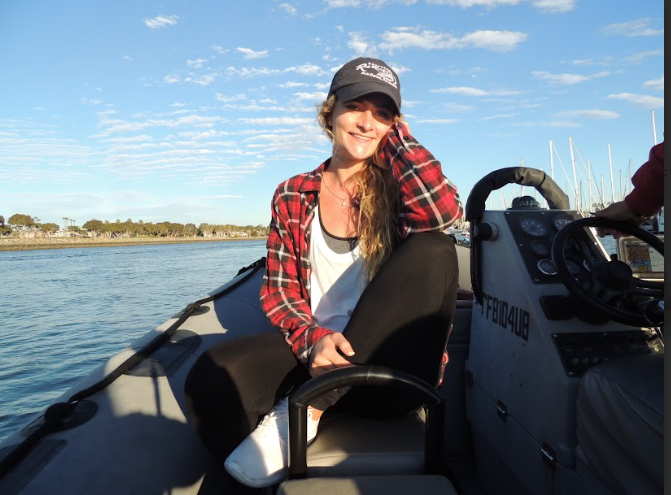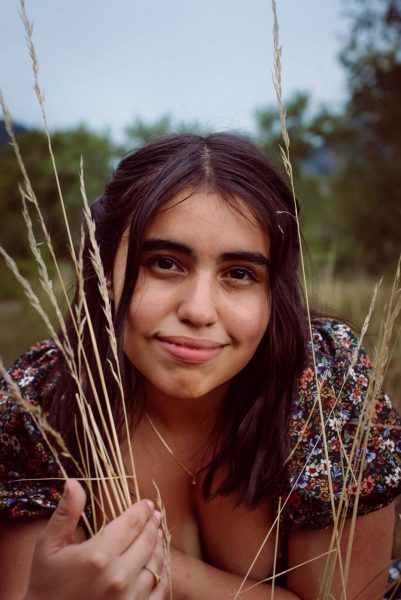In fifth grade, Arvada West High School Community Resource Liaison Joann Barkhuff, took a trip to San Diego with a program called Seacamp, to go on a week-long whale-watching tour. During her week on the ocean, Barkhuff simply “fell in love” with the ocean and all it’s beauty.
Since she was a kid, the ocean seemed to follow the path of Barkhuff’s life. Her grandparents lived in Bonaire; her grandpa in particular loved to scuba dive and loved marine life. As she grew up, she saw photos upon photos of the pictured experiences her grandparents and family had had out at sea. In fact, a wall in her childhood home in Las Vegas had an ocean and lighthouse-themed mural painted by some family members.
As she moved to Mauii, Hawaii when she was 17, the experiences of swimming among sea turtles and dolphins began to foster Barkhuff’s deeper appreciation for the ocean and highlighted the connectivity between every living thing on Earth. Experiences like these, ultimately resulted in instilling a greater gratitude in Barkhuff, since she realized exactly how lucky she is to have experiences that are “ just a part of life, a part of the world…that people don’t really get to see and don’t really get to experience.”
For college Barkhuff moved to San Diego for a decade to pursue a bachelor’s Degree in Business Administration at San Diego State University and a Masters degree in Social Innovation at the University of San Diego. For seven out of the ten years spent in San Diego, before moving to Colorado in January of 2024, Barkhuff was involved in a marine ecotourism company known as Pacific Marine Research – with a sub-branch of the company being named Adventure Whale Watching – where she held a number of titles such as General Manager, Director of Marketing and Operations, to her current title of Director of Resource Management.
A number of roles comes with a number of experiences, and a number of perspectives. From the business side, she has learned “how you can structure a business that is doing good in a way that is sustainable, and relies on its own income to operate.” These roles have also taught her more “ soft skills’‘ such as leadership and customer service. But a larger part of her time with Pacific Marine Research has been Barkhuff’s experiences in the different tours her company offers, a few being whale watching, tours of the Los Coronado Islands and islands Mexico, and finally San Diego Bay.
From her experiences on these tours and her work with Pacific Marine research, she confidently states that “ most people are not very educated on marine wildlife and much less so on their impact on marine wildlife.” Especially since most people live in cities and suburbs, Barkhuff has noted that generally people “feel like their life is so disconnected from nature.”
In order to combat this, education on the impacts humans have on the marine ecosystem is always the most emphasized element of any tour experience, as it is a goal to foster a connection with nature. Pacific Marine Research does this for example, by having passengers pull trash out while on the side of the boat.
Education is also important and brought in when it comes to endangered species. In 1972, the Marine Mammal Protection Act was established “to prevent marine mammal species and population stocks from diminishing, as a result of human activities.” Due to this act, the company has a greater obligation to protect marine wildlife. According to Barkhuff, a part of “our goal for being out there is not only to do it in a safe way but to advocate for it being done in a safe way.” While out at sea, this looks like calling in to help animals who are entangled or communicating through VHF radios to advise private boaters who Barkhuff has observed “don’t know how to approach wildlife.”
In fact, when it comes to the protection of endangered whales and marine wildlife, ethics was a focus of a paper Barkhuff wrote for a course titled Environmental Justice during her master’s degree. This paper contained proposed solutions to issues Barkhuff has seen throughout her time with Pacific Marine Research, such as solutions for “ ghost fishwear” or the lost fishwear that animals oftentimes get entangled in, and showing speed limits on AIS software so boats will be more aware of the limits in hopes of not running over whales or other wildlife. While this paper never ended up being published, the research from it was used for Pacific Marine Research.
These are only a few examples of what Barkhuff has learned in her time with Pacific Marine research, and with enthusiasm, she comments that “to summarize everything that I’ve learned through that experience is just like so much so much [knowledge,]” and she embraces the fact that she now has “this comprehensive whole view” of many of the different aspects of marine life and the struggles faced.
But with all of the issues she has seen an experienced, and with continuously growing environmental issues, Barkhuff admits to being discouraged about the future. “ These species of animals are probably going to become completely endangered because there is not enough happening fast enough to be able to protect them or do anything.” And there is a part of her that is “sad and defeated,” and a part that thinks there is “ no hope.”
“ I just hope all of it can happen fast enough… It is kind of like out of sight out of mind, they’re [people are] disconnected from it and they do not think about it,” she comments.
However, on the other hand, “there’s another part of me that like that’s not true. There are other organizations working on it.” Despite their negative reputation, in Barkhuff’s experience, SeaWorld has been one of these organizations, specifically because of their marine rescue team and their work.
Recalling interactions she has had with them, Barkhuff explains that there have been many times when “ I will call them and they will go out there and meet me somewhere and save an animal. I’ve seen them save, I don’t know, so many animals’ lives, [by] just coming out there and rescuing animals who are hurt or entangled.” She also notes other organizations who are working towards solutions for ocean clean up and mentions tracking software that has come out “where they are tracking species of endangered animals [who]lose their patterns so that way we can create systems that inform people.”
And even though in Barkhuff’s time there have been plenty of experiences that reflect the need for humans to support the ocean, its wildlife, and the environment, her time with Pacific Marine Research has also been filled with moments of joy from animals that have continued to spark Barkhuff’s wonder, curiosity, and awe for marine life. She recalls a number of memories, such as one time when she was out on a boat with blue whales and dolphins. The boat engines turned off and Barkhusff could hear all “their little squeaks and things,” when three huge blue whales swam around the boat close enough to look them in the eyes.
In that moment when Barkhuff returned their gaze, she saw all of the humanity in these animals “and that was just incredible; they are just magnificent, like magnificent creatures.”

Photo courtesy of Barkhuff
Or there is the time when she was surrounded in the water by a nursery pod of baby dolphins. “What is amazing is that they’re doing it voluntarily. They are as curious about us as we are curious about them, and they are coming up to us being like ‘Who are? What are you,?’ and I’m like ‘I don’t know, what are you?’”
She also remembers moments such as the time she and her company were featured in a Yes Theory video on YouTube.
Now living in Colorado for almost the last five months, Barkhuff misses the ocean more than ever. Being in a city has been a difficult adjustment for her since in “downtown Denver there’s just no wildlife.”
To cope with this change, Barkhuff resorts to practices like journaling and maintaining morning and night time routines, and trying to get out in nature whenever it’s possible. But even with that, Barkhuff still says that it is “possible that I will end up moving back .”
Until then, her work with Pacific Marine Research will continue to happen even distantly, and though she may not be living by the ocean like she used to, Barkhuff will always have a piece of the ocean and her love for marine life that she has had since she was a kid. After all, everyday she still puts on a whale-tail-shaped necklace given to her by her grandfather.



